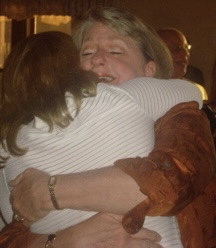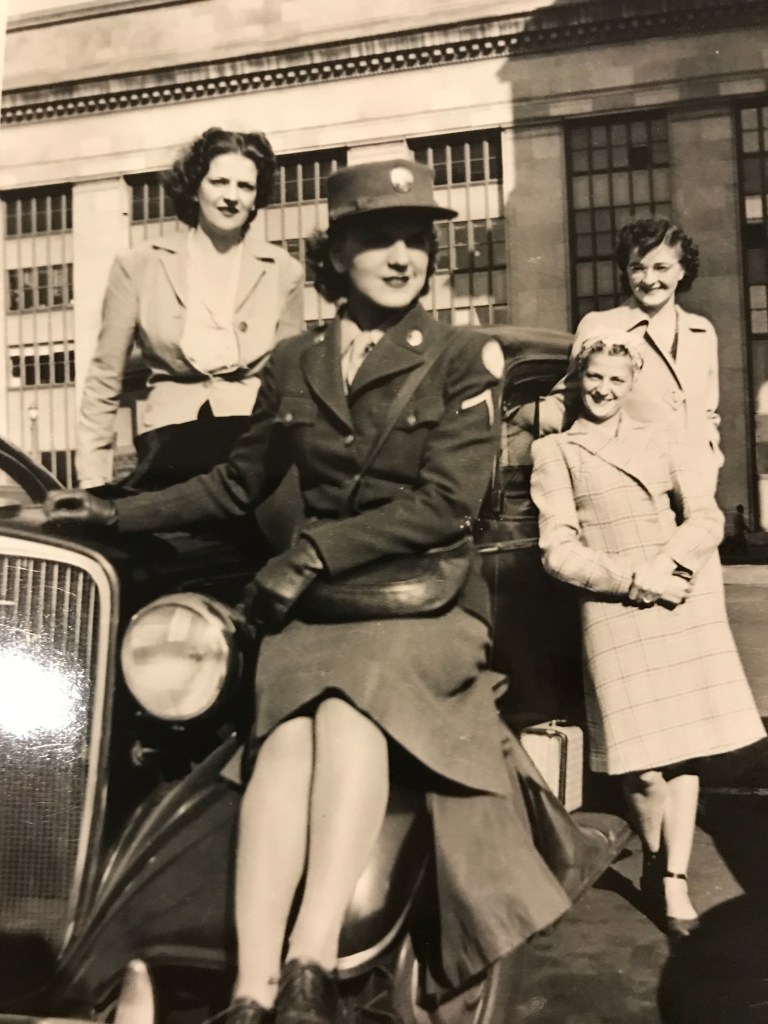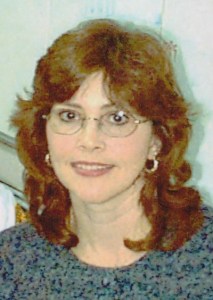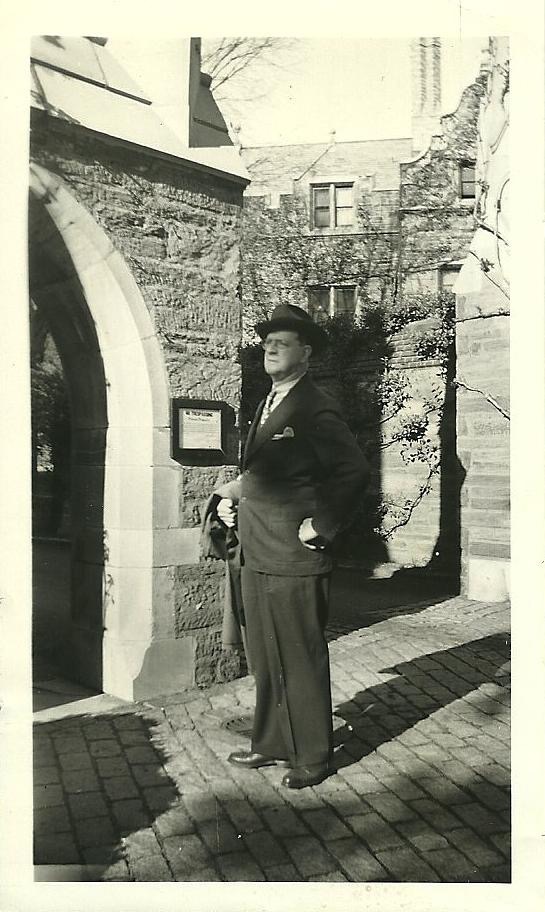For centuries, the Church has understood something essential about music: that music reaches places in our hearts and minds that words, alone, cannot. Sacred music carries theology without argument. It teaches without having to explain. It lifts one’s soul – not by power or persuasion, but simply by its own beauty. Johann Sebastian Bach wrote at the top of his manuscripts, Soli Deo Gloria – “To God alone be the glory.” Bach did not see sacred music as decoration for worship, but as worship itself.
Nora, who was my sister, older by eleven years, believed this, too. Music was a passion and a calling for her. Every hymn she taught, every choir she shaped, every service she played was an offering of sorts. She loved music deeply, and sacred music was what returned the deep love of her life. Nora and Richard met and fell in love through their shared appreciation of sacred music, when she was the organist and music director at Roxborough Methodist Church and Richard was in her choir.
Whether Nora’s musical destiny was genetic or whether her talents were by-products of our family’s musical environment, one can only speculate. My parents were also church musicians. Our mother was a soprano soloist, and our father had a resounding bass voice. Dad was employed for thirty-three years of Sundays by the First Christian Science Church in Glenside (though he was not a Christian Scientist). Our parents sang and performed their entire adult lives. This instilled in us all a special reverence for traditional church music, especially Nora.
Growing up, it was commonplace to hear four-part harmony around our family piano. Favorites from the Episcopal Hymnal were central, on Sundays and holidays. During the years when Nora attended her much-beloved Westminster Choir College, the door to our home was always open to her fellow classmates. I’m not sure I can adequately describe the musical talent or the voices that occasionally inhabited the living room of our tiny split-level home during those years, but I will try. Simply put, it was a combination of prayer and doctrine made audible, through perfect harmonies and voices that were gifts from God. I was very young – only seven when Nora first went off to college and eleven when she graduated – yet the memory of it is still fresh. How fortunate an upbringing we had! I am so grateful for it all.
Indeed, music was a gift from God to Nora, fostered by our parents, and by the Church and generations of others, who also believed that sacred sound is meaningful. And Nora forwarded this legacy to every student she taught and to the choir members she guided. When Nora was immersed in sacred music, in a curious way, she bridged a bit of heaven and earth – with hands on keys or feet on pedals or simply with her voice. Through her music, she helped the rest of us traverse that expanse, too. Every congregation she served carries something of her still; I do, as well.
I was a cellist – and Nora spent countless hours shaping my own abilities as a young musician. She helped me prepare for many an audition, improving my own musicality. We performed Bach’s Six Suites so often together as a piano / cello duet, that the image of us playing together comes flooding back every time I hear those familiar arrangements. She didn’t just help me practice the notes. She helped me find the music inside them. In those moments, she was not only my sister, but my teacher, my collaborator, and my calm center for performances.
Now, I’m not so sure whether Nora’s calling first occurred in the womb, in the rocking chair hearing my mother’s or father’s voice, or from the choir stalls in the churches our family attended. But I will share a little story with you today that might serve to shed some unique light on when Nora may have first realized the inherent power of church music. (It will also give those of you who never met our mother a quick introductory course about her “uniqueness”, as well.) I have been told numerous iterations of this tale, so I will paraphrase it as best I can. Apparently, when Nora was quite young (five or six-years-old – more than 70 years ago), there was a little Jewish boy who lived directly next-door. According to Mom, he was frequently a naughty little boy and, one day, while playing in the backyard sandbox, he shoved Nora to the ground and hurled a bucket of sand in her face, sending her into the house crying. Not missing a beat (and having had addressed numerous prior incidents with the little boy’s parents to no avail), Mom washed Nora’s face… quietly sat her down… and instructed her to get up, go back outside to the unruly little boy, as if nothing bad had just happened, and to teach him all of the lyrics to… “Jesus Loves Me, This I Know, for the Bible Tells Me So” – and, this is important– to instruct him to sing it to his family, in turn. “They’ll all love it”, our mother assured her. And so, that’s what Nora did.
Now, clearly, Jesus was likely not pleased with the idea of being leveraged to even a score but, I’d like to think He thought my mother was at least innovative, even if her idea / execution of justice was a little flawed. The point of the story flawed as that “peaceful protest” might have been, this is where sacred song and evangelizing for Jesus may have first resonated in Nora’s heart. And, fortunately, as Nora matured and eventually married Richard, her Christian witnessing and views on other people’s faiths, beliefs and lifestyles matured, too! Over our lifetimes together, Nora and I had some wonderful, meaningful, and memorable exchanges about religion, Judaism, God, sin and redemption. Our family upbringing actually exposed us to a wide array of beliefs and traditions, including the beautiful music that each tradition offered. Nora also wholeheartedly admired and respected Richard’s Quaker education at Penn Charter. She and I had discussed, on numerous occasions, how refreshingly simple and accepting the Quaker philosophy can be, relative to intercession with the Divine. Still, on some level, the “Jesus Loves Me” moment was, arguably, a defining one. It did demonstrate how music can be empowered as a conduit for grace, and maybe even how turning to Jesus through song, in times of trouble and hurt, is another form of prayer, always.
When I was thirteen, Nora moved into a living space in our home’s basement level that Dad had converted for her. She was just starting out in her career as a teacher and was an organist / choir director on the weekends. I had the bedroom on the upper level of our home. Within weeks of taking the position of organist at Roxborough Methodist Church, she had her eye on Richard and, shortly after that, the two began dating. At that time, I was hoping that Nora, as my older sister, would teach me about dating and, (alas!) I had discovered the miracle that, though several floors of our house separated us, sounds were nonetheless easily conducted via our home’s vent structure. When Richard would return home with Nora after their dates, I would press my ear against the heating vent, hoping to hear what loving things they said to one another. Truth was, I was desperately hoping to pick up tips on making out with a boy. Unfortunately for me (but fortunately for them), I blew my cover very early on as I sniggered out loud. I was shocked, surprised and humiliated, when Richard talked back UP through that vent system to me! From that point forward, she and Richard learned to keep completely quiet and to fly outside my radar. Shortly thereafter, they got married and Nora moved out. I had to figure the rest out on my own.
Nora and Richard set an example for many about goodness and decency in marriage. Eric and Louisa are beneficiaries of that example, as are Nora’s two gorgeous grandchildren, by extension. Nora loved Fritzi and Basil and proudly sent photos of them to me all of the time, up until the days before her passing. The last photos I have include several from Christmas of Fritzi at church in her beautiful red coat and of Basil’s ten-month photos and sitting on Santa’s lap. Seeing Basil reminded me so much of Eric at that same age. Eric was equally as adorable as his two children and I was always so proud to babysit him, when Nora and Richard went sailing and entrusted him to my care.
Because of our disparity in age, Nora and I didn’t really have a quality adult relationship until I was in my twenties. I was in my early twenties when I lost both of my parents and so Nora occasionally stepped into the role of “mother” to me. Those who know Nora know she could be a take-charge, step up to the plate kind of person. She went with me to buy my wedding gown when Gary and I decided to marry. She cried when I said, “yes to the dress”, just as much as my real mother would have cried. I was Nora’s maid of honor, and she was my matron of honor, TWICE. (For me, that second time up the aisle was a charm!)
Nora had numerous talents outside the musical realm. Her sense of elegance in home décor inspired my own affection for eighteenth century American and English interior design. She and Richard taught me much about furniture – as art – and about the glorious balance of form and function in craftsmanship. They instilled in me an appreciation for quality and attention to detail in making a house a home, from setting a proper dinner table to entertaining others in style. Nora had the gift of hospitality.
And, as much as music defined her vocation, it did not define the whole of who Nora was. Alongside her professional sensibilities, there was also laughter – and plenty of it. Nora loved to laugh. We have so many sister memories together of laughing until we hurt – or peed – or both, and many of those memories fit into the “you had to be there” category. But there were a few that stand out in my mind. There was the time we were on Richard’s sailboat and had had just enough of Richard’s delicious bourbon Manhattans that we decided it would be a fun idea to swap bathing suits… with her donning my string bikini, whose bottom did not adequately cover her “HAHA” (as we called it), and me wearing her one-piece that emphasized just how much more generously-endowed she was “UP TOP”, in comparison to me. Other wardrobe situations and malfunctions needed sisterly pinning or tucking in ways and in places that caused such uproarious laughter upon the “fixing”, that it made the fixing positively impossible because we were laughing too much to even move, let alone pin. When Gary and our family all flew to Richmond, Virginia for Eric’s graduation, Nora and I had one such wardrobe moment together that our laughter caused several dozen other ladies to laugh contagiously along with us in the restroom, even though they had no idea what we were even laughing about.
There was the time when my daughter Jordan and I flew out to surprise Nora for her 60th birthday, and Nora’s laughter and big sister hug was something I can still feel, just looking at the photo memories of it. The photo of that hug has been included at the top of this blog post. She and I even managed to laugh together, despite the sadder times. When I came out to take care of her for the weeks of her own surgical recovery following Richard’s death, we managed to somehow find laughter through the most awkward of moments, as I re-bandaged her spinal wounds; such were precious-yet-embarrassing moments of physical needs that sisters don’t mind sharing together. These were among the times that are cherished of shared “sister” moments… a different kind of moment, in a category all unto itself.
In very recent years, it became harder to find the levity amongst loss and grief. Still, in the midst of it, Nora shared precious secrets with me. I assured her I would keep her confidences safe, and I did, right up until her death. We sent scores of photos back and forth, and regularly forwarded long strings of puns via email. We shared a common affinity for three particular comedians on social media, followed a bunch of interior design sites and shared pages about dogs and politics… and politicians who were dogs. I sent her photos of the wedding dress my daughter is planning to get married in, next December and asked for her opinion. And the day before she died, Nora had sent me an Instagram reel by one of our mutual favorites – British humorist Michael McIntyre, who we would share back and forth almost weekly. Therein lie some of the special coveted ingredients about sisterhood – shared glances, shared thoughts, shared photos, inside jokes, stories retold so often they become legends, love and laughter that catches one off guard and stays memorable long after the moments have faded. For sure, relationships and love are not always “neatly” packaged. They ebb and flow with the cadence of life. But, along the way, love and laughter make lives well-lived, and both can manifest and take shape in many ways – privately and publicly.
Lastly, I will make this observation: when Eric sent me Nora’s obituary, one thing was surprisingly poignant about it. Nora has been a member of Grace Presbyterian Church for 45 years. That says something quietly profound about Nora. There are few people who can stay faithful to the same body of believers for that length of time. So many pastors have stood in the pulpit at Grace during those 45 years. Friends have been made there, tears have been shed there and babies have been baptized there – including Eric.
During those four and a half decades, church leadership has changed a lot. Philosophies preached have shifted. Policies and priorities have morphed, as they inevitably do in any organization. But Nora remained – not because everything at Grace always aligned with her own views (they most certainly didn’t). That’s not always so easy. The sanctuary and the messages that emanate from the pulpit are intended to lift our souls above the noise of the world, not to echo it or add to it, yet, that is not always what happens in the church at large – and, by extension, not always what has happened at Grace Church. Worship among congregants can only fully flourish when earthly divisions can be set aside, however. When worldly ideology becomes entwined with theology, many will quietly slip out the church’s back door, not always in protest but in quiet retreat. That is a simple fact of church life. It is Scripture that calls us back from that brink, to what is eternal, rather than what is merely loud, or “woke” or popular in the moment. The pulpit exists to proclaim the Truth that transcends the flawed ideologies of imperfect humans. In some of our deepest, most heartfelt conversations about church life, Nora and I discussed these very things. I think Nora fully trusted that the Gospel does not get power from the pulpit. She knew that the pulpit only needs to be faithfully given voice by the Gospel, as is the case with the sacred music Nora so loved. Nora trusted the long arc of God’s Word.
Without doubt, forty-five years in one Presbyterian church speaks to a faith shaped by covenant rather than convenience or casual attendance. I choose to imagine that Nora came to a place of reconciliation and peace with differences in perspectives, just as her beloved Johann Sebastian Bach had – via music. The music of the sanctuary at Grace Church transported Nora’s heart and mind solely to the glory of God. Ultimately, this enabled her to be unburdened by the personal agendas or the viewpoints of others with the church that were sometimes Biblically askew. Sacred music is a safe refuge; it never asks or cares about for whom you voted, who you personally dislike, or your take on the current events of the moment. It seeks only your heart for God.
Those thoughts lead to the final moral of this story – and perhaps the moral of Nora’s life. Sacred music, like our faith itself, has been formed over time – through discipline, listening, learning and a willingness to remain present and assured with a perfect God Almighty, no matter the noise or cacophony around us. Nora is now with the company of others in heaven who loved her and with the God she praised not only with an unwavering heart and belief, but with soul and voice. The music Nora offered to so many (like that little Jewish boy in the story from 70 years ago, who was also God’s beloved child) has not ended, but lives on.
And, while it’s true that Nora taught that little boy about Jesus, the little boy, also showed Nora some things about living at an early age, namely this: earthly life is not always without tears or without fears. It is not always funny, always happy, always predictable or always easy. Sometimes, the sands in life’s big sandbox get kicked up into our face and we find it hard to find our way to a safe harbor or refuge. Sometimes, we are hurt when selfishness, pettiness, jealousy or smallness of others kicks us in our face. Nora learned something great in those moments with that little boy, that “stuck” with her about LIVING – something that gave DYING beauty, peace and light. Two simple truths were stored in Nora’s heart and, when her heart stopped beating in her final moments, Nora took those two simple truths to heaven:
- Jesus loves me, this I know, for the Bible tells me so.
- We are weak, but He is strong.
There are other words to this child-like sacred music that you rarely hear. They are simple, yet weighty in their Christian context:
Jesus loves me! He who died
Heaven’s gates to open wide;
He will wash away my sin,
Let his little child come in.
Jesus loves me! He will stay
Close beside me all the way;
Thou hast bled and died for me,
I will henceforth live for Thee.
The moment Nora left us, she knew that Jesus loved her. Our Lord Jesus shepherded her to heaven’s gates, where she, Richard, Mom and Dad might be singing that tune in perfect harmony together – perhaps with some of the other Westminster Choir alumni who are among the multitudes. Nora has no doubt confirmed that God is so good (and that Mom was right) – ALL THE TIME.



 Today is my wonderful (and dashing) husband’s 60th birthday.
Today is my wonderful (and dashing) husband’s 60th birthday. Dear Adlam Relatives –
Dear Adlam Relatives –












 Gary and I met in an astronomy class. We were both finishing our last science elective in college. Neither of us had much interest in the class. As the year and our friendship with each other progressed, both of us realized we were not quite as focused on the subject matter being taught as our fellow stargazers were. Looking back, there is no doubt in my mind that during this study of the heavens, the work of angels was subtly taking place. It had been an over-booked course. The professor had made an exception to the rule by allowing Gary to sign up for the late-night class, and in a jam-packed room, the only available seat was next to me. Fate was a friend that day.
Gary and I met in an astronomy class. We were both finishing our last science elective in college. Neither of us had much interest in the class. As the year and our friendship with each other progressed, both of us realized we were not quite as focused on the subject matter being taught as our fellow stargazers were. Looking back, there is no doubt in my mind that during this study of the heavens, the work of angels was subtly taking place. It had been an over-booked course. The professor had made an exception to the rule by allowing Gary to sign up for the late-night class, and in a jam-packed room, the only available seat was next to me. Fate was a friend that day.

